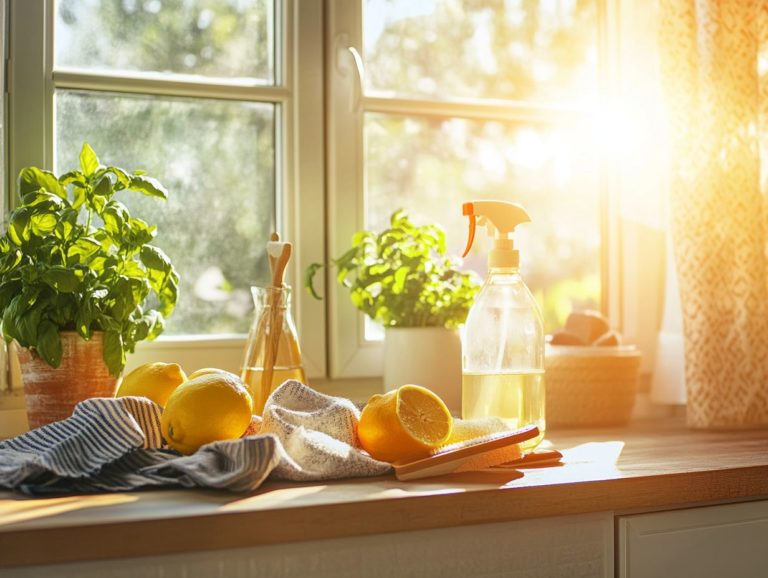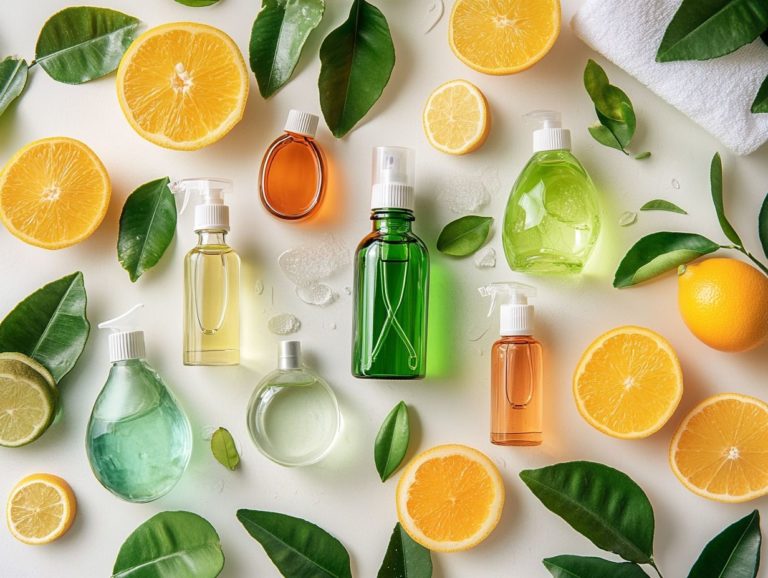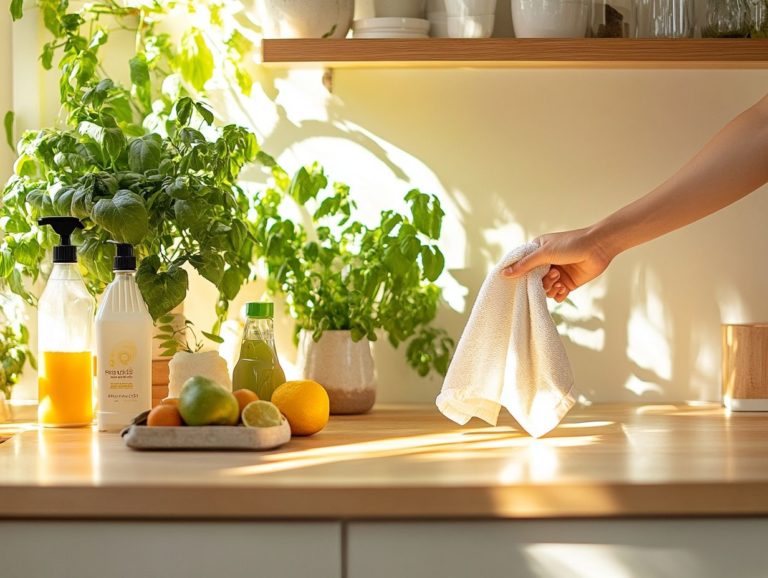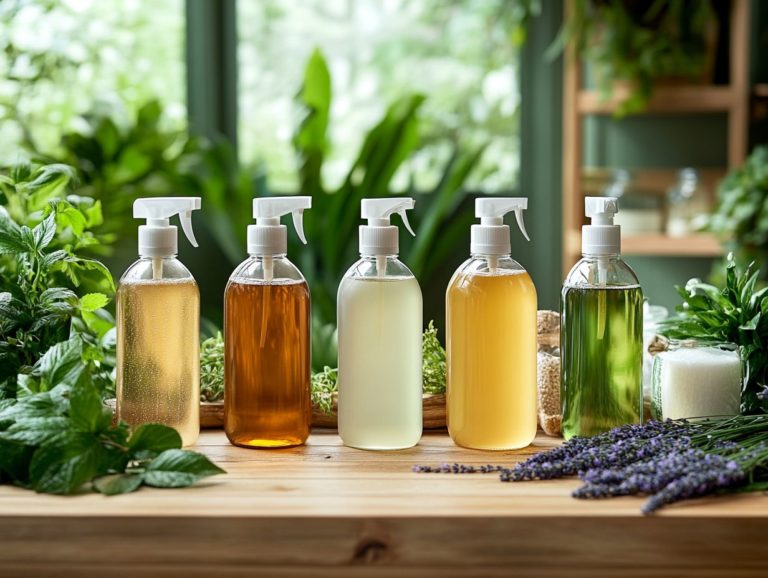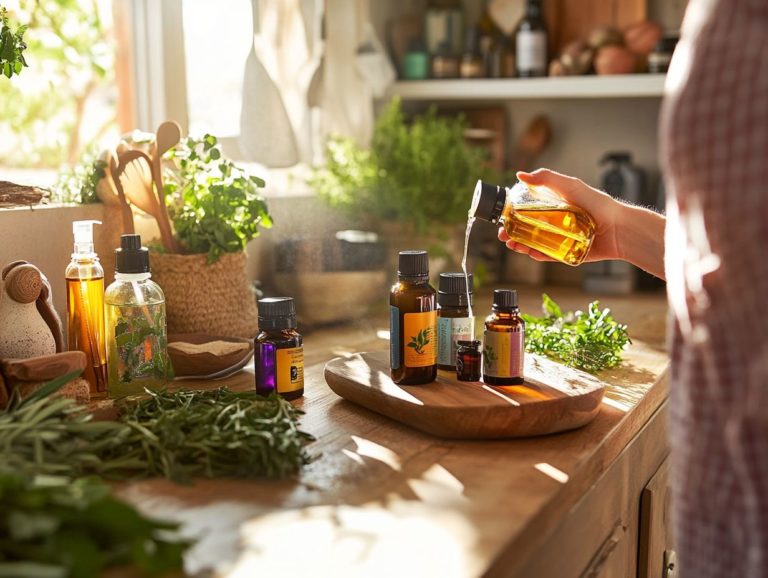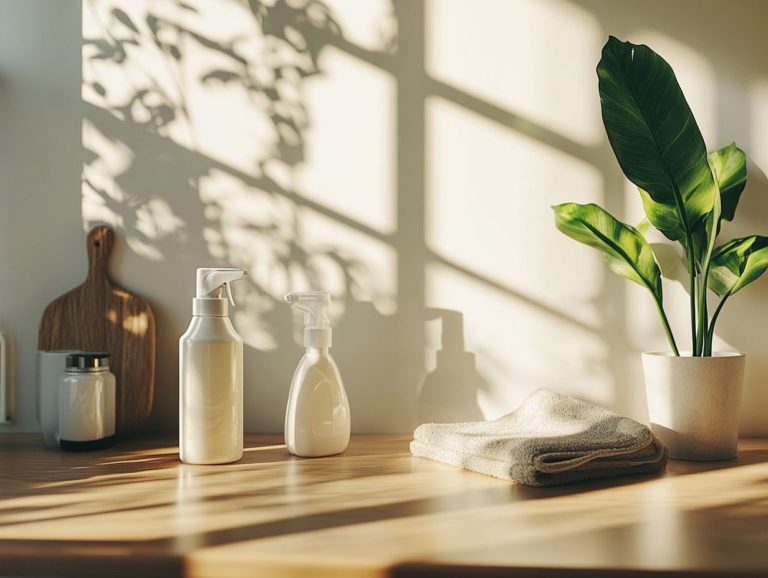How to Use Essential Oils in Homemade Cleaners
Essential oils have become a sought-after choice for those looking to elevate their homemade cleaning solutions naturally and effectively. These powerful plant extracts, such as tea tree oil and lavender oil, can be a valuable addition to your home cleaning routine.
Discover how essential oils can transform your cleaning routine! This article explores the benefits of integrating essential oils into your homemade cleaners and guides you in selecting the right oils for your needs. You ll find practical recipes and tips for crafting safe and effective cleaning products that suit your lifestyle.
Whether your goal is to refresh your home or minimize toxins, essential oils present a charming and eco-friendly alternative.
Contents
- Key Takeaways:
- What are Essential Oils?
- How to Choose the Right Essential Oils for Cleaning?
- What Supplies Do You Need for Making Homemade Cleaners with Essential Oils?
- How to Make Homemade Cleaners with Essential Oils?
- What are Some Tips for Using Essential Oils in Homemade Cleaners?
- How to Use Essential Oils in Laundry?
- 1. Fabric Softener
- 2. Stain Remover
- 3. Scented Dryer Sheets with Essential Oils
- Frequently Asked Questions
- What are essential oils and why are they beneficial in homemade cleaners?
- What are some essential oils commonly used in homemade cleaners?
- How do I incorporate essential oils into my homemade cleaners?
- Are there any safety precautions to keep in mind when using essential oils in homemade cleaners?
- Can essential oils replace chemical cleaners?
- Do essential oils have any other benefits besides cleaning?
Key Takeaways:
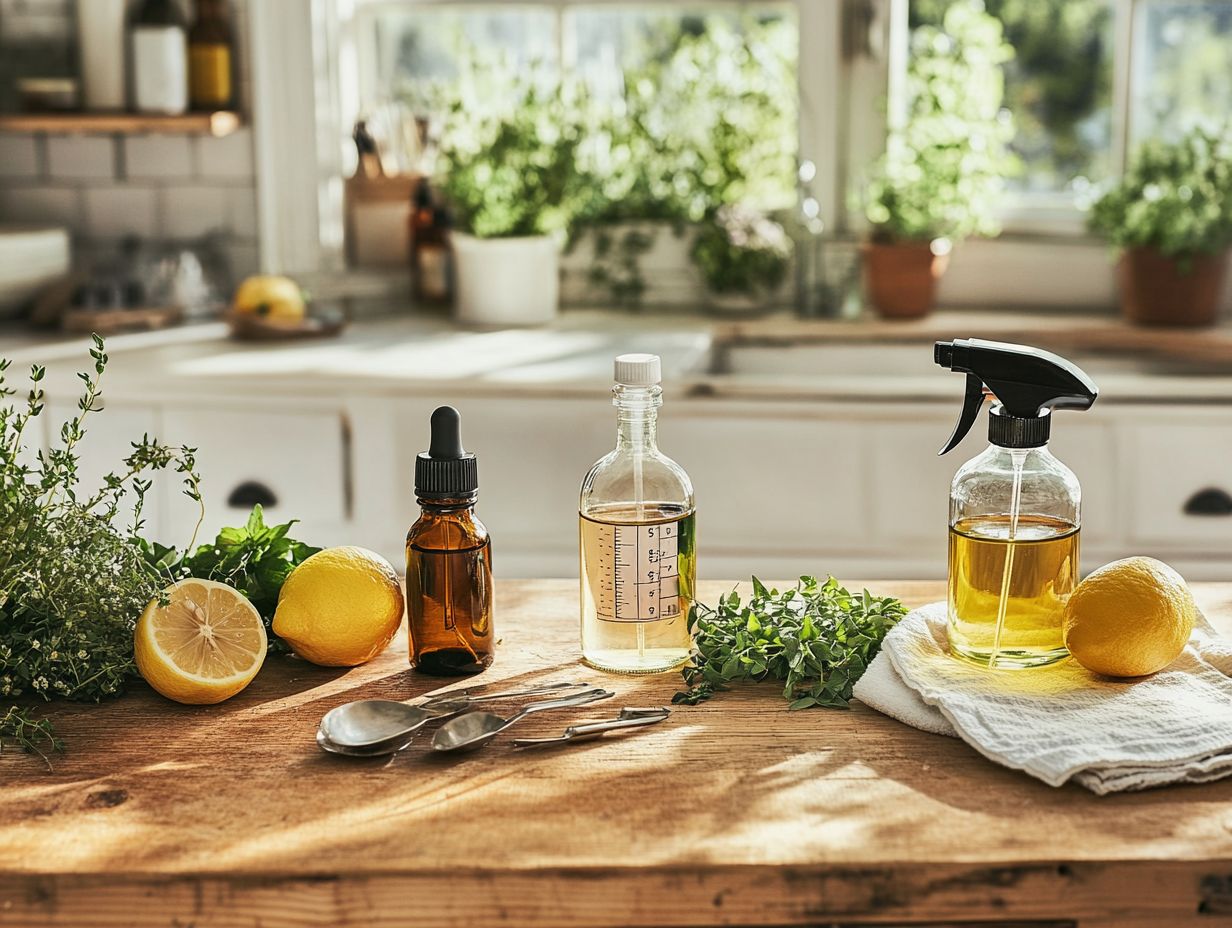
- Use essential oils in homemade cleaners to reap their numerous benefits, such as natural disinfecting and aromatherapy properties.
- When choosing essential oils for cleaning, consider their antiseptic and antimicrobial properties. Always use caution and dilute properly to avoid any potential safety hazards. Opt for organic essential oils and pet-safe essential oils to ensure a safe cleaning environment for your household.
- Essential oils can be used in various homemade cleaners, from all-purpose to air fresheners. Be sure to properly label and store your cleaners and test on small surfaces first. They can also be incorporated into laundry routines for fresh, scented clothes.
What are Essential Oils?
Essential oils are concentrated plant extracts that encapsulate the natural aromas and beneficial properties of various botanicals. This makes them a favored choice in natural home methods, wellness routines, and eco-friendly cleaning solutions. Brands like Mountain Rose Herbs offer a wide variety of organic essential oils for all your needs.
Derived from different parts of plants leaves, flowers, or roots these oils offer a multitude of applications, from aromatherapy to DIY cleaners. With their antimicrobial and antibacterial properties, essential oils such as tea tree, lavender, and lemon are perfect for crafting non-toxic products that purify both the air and surfaces. This allows you to maintain a clean home without resorting to harmful chemicals.
What are the Benefits of Using Essential Oils in Homemade Cleaners?
Using essential oils in your homemade cleaners brings a wealth of benefits. These oils have natural antimicrobial and antibacterial properties that help you create effective, non-toxic products for a pristine home.
Essential oils act as powerful cleaning agents and infuse delightful aromas into the air. This transforms your cleaning routine into a holistic ritual that promotes both health and well-being.
By incorporating potent plant extracts, you often achieve superior results compared to conventional commercial cleaners, which can contain harsh chemicals that irritate your respiratory system and pose various health risks. Essential oils are a more eco-friendly choice; their biodegradable nature minimizes environmental impact, ensuring that harmful substances don t make their way into waterways.
Opting for DIY cleaning solutions enhanced with these natural extracts allows you to cultivate a safer living space while embracing sustainable practices. These practices reduce reliance on plastic packaging and synthetic ingredients. You can further enhance the effectiveness of your homemade cleaner by incorporating ingredients like lemon juice, baking soda, and vinegar.
How to Choose the Right Essential Oils for Cleaning?
Selecting the right essential oils for cleaning is essential for achieving effective results while ensuring a safe and healthy environment in your home. Consider the specific cleaning tasks you want to tackle, the scent profiles that resonate with you, and the health benefits linked to various oils. This thoughtful approach will help you choose the most suitable options, creating a holistic cleaning regimen that elevates your space.
Start your journey to a cleaner, healthier home today with essential oils!
What are the Best Essential Oils for Cleaning?
The best essential oils for cleaning in your home include tea tree oil, known for its strong ability to fight germs. Lavender not only purifies but also infuses your space with a calming fragrance. Lemon essential oil is a standout as well, with its refreshing scent and natural ability to cut through grease. This makes it perfect for all-purpose cleaners and various household surfaces.
You can also consider eucalyptus essential oil, great at keeping bugs away and cleaning the air. It makes an excellent addition to a natural disinfectant spray. Peppermint oil is another powerhouse; its invigorating aroma can awaken your senses while its antibacterial properties work to keep surfaces free from harmful microbes. Try essential oil blends like lavender dragon or citrus sunrise for a unique aromatic cleaning experience.
Orange essential oil does more than just lift your spirits; it’s also adept at breaking down sticky residues, making it an ideal ingredient for your kitchen cleaning solutions. Each of these oils can be seamlessly integrated into a variety of DIY cleaning recipes, helping you create a healthier and more inviting environment in your home.
What are the Safety Precautions when Using Essential Oils for Cleaning?
When you re using essential oils for cleaning, it s essential to prioritize safety to ensure a secure and effective experience, especially when crafting your own non-toxic products. Always remember to dilute your essential oils properly, which means mixing the oil with water or a carrier oil to make it safe for use, to prevent any skin sensitivity. Keep the safety of pets and children in mind by choosing pet-safe essential oils whenever necessary.
Besides proper dilution, be aware of potential allergic reactions that certain oils may cause. Always conduct a patch test on a small area of skin before applying them fully, and watch for any adverse reactions.
Safe storage practices are just as crucial. Store your essential oils in dark glass containers, away from direct sunlight, to preserve their potency. When creating your cleaning solutions, keep all essential oils out of reach of children and pets, as some oils can be toxic if ingested.
By taking these precautions, you ll significantly enhance both the safety and effectiveness of your cleaning routines with essential oils.
What Supplies Do You Need for Making Homemade Cleaners with Essential Oils?
To craft your own effective homemade cleaners using essential oils, gather a few key supplies that will streamline both the blending and application of your cleaning solutions.
Essential ingredients to consider include castile soap, known for its gentle yet effective cleansing properties. Use rubbing alcohol for its disinfecting capabilities. Natural agents like vinegar and baking soda elevate the cleaning power of your essential oil concoctions.
Don t forget to add scent blends like chai spice or thieves blend for added fragrance and cleaning power. Gather these supplies today to start enjoying a cleaner, fresher home!
How to Make Homemade Cleaners with Essential Oils?
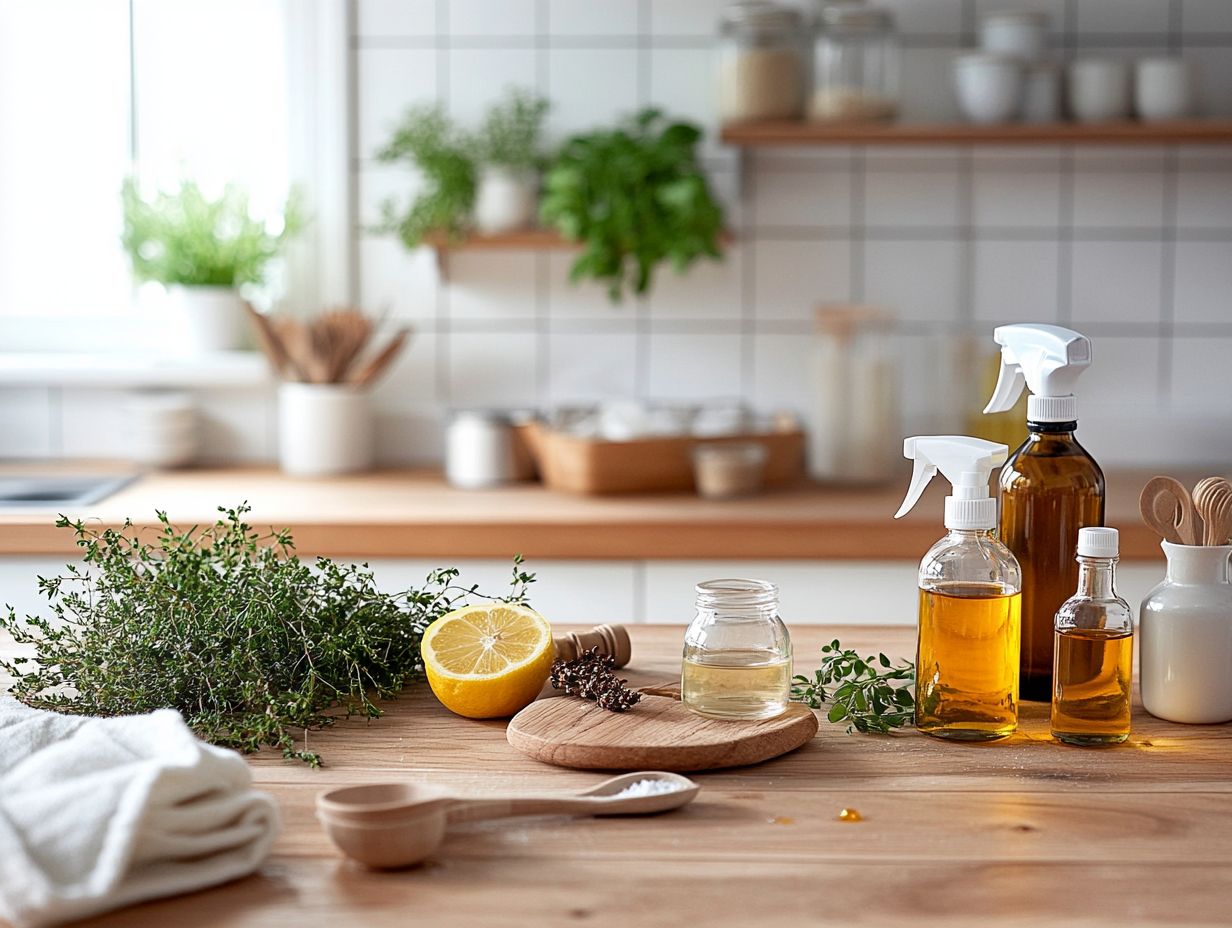
Making your own cleaners with essential oils is easy and fun! Whether you’re crafting all-purpose cleaners, glass cleaners, specialized disinfecting solutions, or natural air fresheners, each recipe allows you to harness the potent benefits of essential oils.
This results in effective and eco-friendly alternatives to conventional commercial products. These DIY recipes often include versatile ingredients like castile soap, vinegar, and essential oils for creating safe and powerful cleaning solutions.
1. All-Purpose Cleaner
An all-purpose cleaner crafted with essential oils can be your secret weapon against dirt and grime on various surfaces throughout your home, all while utilizing the strength of natural cleaning agents. By blending vinegar, castile soap, and a selection of essential oils like lavender or lemon, you ll create a strong cleaner that effectively cleans and deodorizes any space.
This versatile cleaner is perfect for your kitchens, bathrooms, and even living areas. It provides both efficiency and an inviting aroma that enhances your home s atmosphere. Whether you are dealing with dirt and grime or seeking odor removal, this cleaner has you covered. To whip up this eco-friendly concoction, gather the following ingredients:
- 1 cup of white vinegar
- 1 cup of distilled water
- 1/4 cup of liquid castile soap
Begin by mixing the vinegar and water in a spray bottle. Then gently add the castile soap. For an invigorating scent, introduce 10-15 drops of your favorite essential oil be it zesty lemon or soothing lavender.
Give the mixture a gentle shake to ensure all the ingredients are well combined. This simple solution will leave your home sparkling clean and fresh!
2. Glass Cleaner
Creating your own homemade glass cleaner with essential oils is not just a straightforward endeavor; it promises a streak-free shine without the presence of toxic chemicals. By combining vinegar, rubbing alcohol, and a few drops of essential oils like lemon or grapefruit, you can effortlessly clean your windows and mirrors while indulging in a refreshing scent.
This DIY method fosters a healthier living environment and gives you the power to customize your cleaning products to suit your preferences. Take a spray bottle and combine one cup of distilled white vinegar with one cup of rubbing alcohol for an effective cleaner. Then, add about 10 to 15 drops of your chosen essential oil, ensuring it enhances both the cleaning efficacy and the delightful aroma.
Incorporating oils such as lavender or tea tree will also infuse your cleaner with germ-fighting properties, increasing its versatility. With this simple recipe, transforming your glass surfaces into sparkling reflections becomes not just an obligation but a genuinely enjoyable and eco-friendly task.
3. Disinfecting Cleaner
A disinfecting cleaner crafted with essential oils is essential for quickly eliminating germs and bacteria in your home. By blending rubbing alcohol with tea tree oil and other essential oils like eucalyptus, you create an effective, natural cleaner that sanitizes your space without resorting to harmful chemicals.
This mixture delivers a delightful aroma and taps into the natural germ-fighting properties of each ingredient. For this recipe, you ll want to use one cup of rubbing alcohol, which serves as a potent disinfectant. Pair it with ten drops of tea tree oil, celebrated for its ability to combat a variety of pathogens. Adding five drops of eucalyptus oil amplifies the formula s strength, leveraging its antiseptic qualities.
To complete the blend, consider incorporating a quarter cup of distilled water to dilute the mixture, making it safe for use on various surfaces. For an enhanced cleaning experience, try adding a few drops of organic essential oils like lavender or peppermint. Together, these components work in harmony to create a cleaner that is both effective and gentle on your living environment.
Try making these cleaners today for a fresher, healthier home!
4. Air Freshener
Creating a natural air freshener with essential oils can elevate the ambiance of your home while effectively eliminating unwanted odors. By combining water with vinegar and a selection of essential oils, such as soothing lavender or a zesty citrus blend, you can craft an eco-friendly air freshener that infuses your space with delightful scents.
This DIY air freshener revitalizes the air and is a healthier choice by steering clear of synthetic chemicals commonly found in store-bought options. For those looking to practice green cleaning, this is an excellent choice. To prepare your homemade spray, gather these simple ingredients:
- 1 cup of water
- 1/2 cup of white vinegar
- About 20-30 drops of your chosen essential oils
Combine these elements in a spray bottle, give it a good shake, and spritz it throughout your home whenever you detect unpleasant aromas. Essential oils like tea tree, eucalyptus, or grapefruit are known for their antibacterial properties, making this blend effective in fighting odors while enhancing your overall well-being.
By choosing this natural solution, you can bask in a refreshing atmosphere without sacrificing your health or the planet’s welfare.
What are Some Tips for Using Essential Oils in Homemade Cleaners?
When incorporating essential oils into your homemade cleaners, several key considerations can enhance both their effectiveness and safety. It s crucial to properly dilute the essential oils to unleash their full cleaning potential while reducing the risk of skin sensitivity or toxicity.
This is especially important for ensuring your home is safe for pets when using essential oils. Brands like Mountain Rose Herbs offer a variety of organic essential oils suitable for pet-safe formulations.
1. Dilute Essential Oils Properly
Diluting essential oils properly is paramount for safe usage in your homemade cleaners. Undiluted oils can lead to skin irritations or other unwelcome reactions. It s advisable to follow specific mixing guidelines based on the type of oil and its intended application, ensuring that the products you create are both effective and non-toxic.
For general cleaning purposes, a dilution of 1-2% is typically sufficient. This means adding around 6-12 drops of essential oil to 1 ounce of a carrier liquid, like water, castile soap, or vinegar. For more challenging tasks, like disinfecting surfaces, a higher concentration might be advantageous. Conversely, lighter oils, such as lemon or lavender, should be diluted even further, ideally around 2-3%.
Always consider the surface material and the strength of the oil. For instance, tea tree oil is a powerful natural disinfectant but should be used with care on sensitive surfaces. For cleaning various surfaces like wood, fabric, or tile, lemon essential oil and lavender oil are excellent choices. By following these guidelines, you can preserve the integrity of the surfaces you re cleaning and create a safe environment free from harsh chemicals.
2. Label Homemade Cleaners with Essential Oils
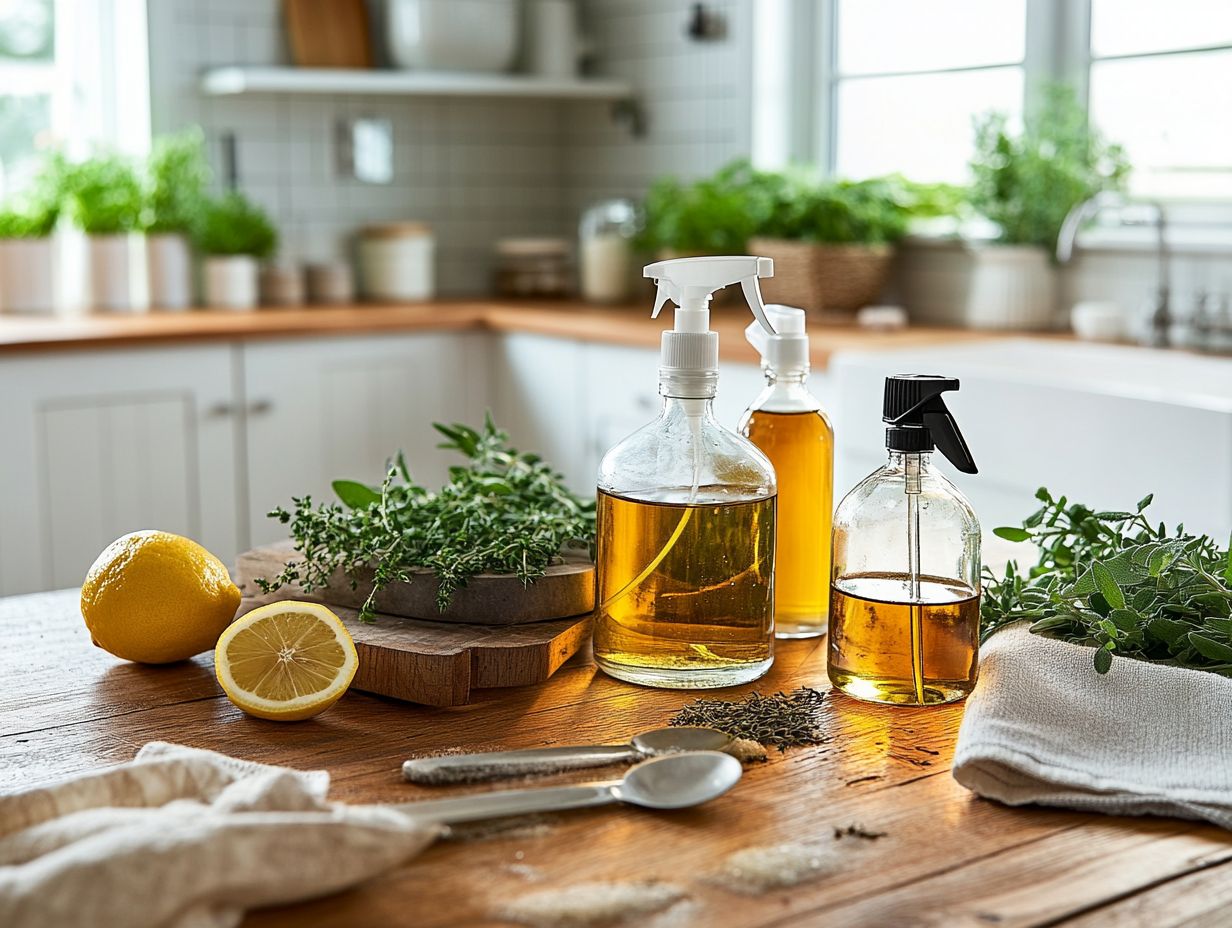
Labeling your homemade cleaners with essential oils is essential for both safety and organization. Clear labels help prevent accidental misuse and ensure that everyone in your household is aware of each product’s properties and any necessary precautions.
This practice enhances safety and streamlines your cleaning routine, allowing you to quickly identify the right solution for various tasks. When creating labels, include the primary ingredients, their specific functions, and any relevant safety warnings. Use easy-to-read fonts and vibrant colors to enhance visibility, making it simpler for family members to find the appropriate cleaner.
Incorporating date information helps you track the freshness of your homemade mixtures, ultimately leading to better organization and fostering a more harmonious cleaning environment.
Try making this air freshener today and enjoy a fresher home!
3. Store Homemade Cleaners Safely
To ensure how well they work, it s essential to store them safely. Keep these products in dark glass containers, shielded from direct sunlight. Store them in a cool environment to maintain their integrity and potency.
Make it a habit to label each container clearly, detailing the ingredients and the date of preparation to avoid any confusion later on. Opting for tightly sealed bottles will further help prevent leaks and evaporation, which could compromise your carefully crafted formulas. Essential oil brands like Mountain Rose Herbs offer high-quality options that are ideal for homemade cleaning solutions.
Be mindful of where you choose to store these cleaners; avoiding places that get hot or cold quickly like near stoves or windows is crucial, as heat can degrade the essential oils. Always keep them out of reach of children and pets.
Regularly inspect your supplies for any signs of separation or unusual odors, as these may indicate that it s time to refresh your stock. This attentive approach will keep your homemade cleaners effective and safe to use.
For an added touch, consider using essential oil blends like chai spice or thieves blend to elevate the aromatic quality of your cleaners.
4. Test on Small Surfaces First
Before you dive into using your homemade cleaners with essential oils on larger surfaces, don t skip this step! It s a savvy move to test them on small, hidden areas first. This precaution helps you ensure compatibility and avoid any potential damage.
By running this preliminary check, you can see how the cleaner works on different surfaces, such as wood, fabric, or tile. Always select a discreet spot for your application, allowing for a genuine assessment of any possible discoloration or adverse reactions. Homemade cleaners offer a fantastic alternative to commercial products, often providing enhanced health benefits and a more holistic home.
Wait a few hours after applying the cleaner to check the area. This waiting period provides ample time for any effects to show up. Keeping a record of your findings can also prove invaluable in identifying which essential oils perform best on specific surfaces. This knowledge ultimately leads you to create effective and safe cleaning solutions perfectly tailored to your home. This is particularly useful for DIY cleaning enthusiasts who frequently experiment with new cleaning recipes.
How to Use Essential Oils in Laundry?
Using essential oils in your laundry can make your clothes smell amazing and work better! This eco-friendly choice not only elevates your laundry but also promotes a healthier environment. Essential oils like lavender, peppermint, and eucalyptus are popular choices for this purpose.
You can seamlessly integrate essential oils into fabric softeners, stain removers, or even use them as scented dryer sheets, ensuring your clothes carry a fresh and inviting aroma every time you wear them!
1. Fabric Softener
Creating a natural fabric softener with essential oils is a superb way to soften your laundry while enveloping it in delightful aromas. When you combine vinegar with your choice of essential oils like lavender or eucalyptus, you end up with a homemade fabric softener that’s not only effective but also eco-friendly.
For a unique twist, try using essential oil blends like citrus sunrise or thieves blend to add a refreshing scent to your fabrics. This approach ensures that your linens smell fresh while also contributing to a healthier environment by steering clear of the harsh chemicals typically found in commercial products.
To whip up this simple formula, you’ll need:
- 1 cup of white vinegar
- 10-15 drops of your selected essential oil
- 1 cup of water
Start by mixing these ingredients in a clean spray bottle. Give it a good shake before each use and add about 1/4 cup to your washing machine during the rinse cycle. This natural fabric softener helps reduce static cling while enhancing your laundry experience with stress-relieving properties and a subtle fragrance from the essential oils.
Incorporating essential oils into your laundry routine also reaps additional health benefits, such as improved mood and relaxation. It’s an economical alternative that helps cut down on plastic waste making it a conscientious choice for the eco-savvy consumer.
For the best results, use high-quality, organic essential oils to ensure you are getting the most out of this eco-friendly cleaning solution. Try making your own natural fabric softener today to enjoy fresh-smelling laundry!
2. Stain Remover
You can easily craft a powerful stain remover using essential oils, ensuring your clothes stay spotless without the need for harsh chemicals. By combining baking soda, vinegar, and tea tree oil, you create an effective stain remover that tackles tough spots while remaining gentle on your fabrics.
Adding a few drops of lemon juice or rosemary essential oil can further enhance the stain-fighting power of this homemade cleaner. Baking soda serves as a natural abrasive, helping to lift stubborn stains without damaging the fibers, making it perfect for your more delicate materials.
Meanwhile, vinegar acts as a natural disinfectant, breaking down grease and grime while neutralizing odors, which significantly enhances your overall cleaning process. This combination is a staple in DIY and natural cleaning recipes, ensuring a green and eco-friendly approach to home cleaning.
Adding tea tree oil provides antibacterial qualities and ensures any lingering bacteria is eliminated especially important for items that come into contact with food or skin. A few drops of lavender essential oil or eucalyptus essential oil can enhance this formula’s efficacy.
Together, these ingredients form a powerhouse formula that not only treats stains effectively but also preserves the integrity and freshness of your garments while being a non-toxic product. Try this homemade stain remover for fresh and clean clothes!
3. Scented Dryer Sheets with Essential Oils
Creating your own scented dryer sheets with essential oils, such as lavender or peppermint essential oil, is an incredibly straightforward and effective way to infuse a delightful fragrance into your laundry without any chemical additives. Using organic essential oils creates a safe home environment.
By soaking reusable cloths in a blend of vinegar and essential oils like grapefruit essential oil or rosemary essential oil, you can craft fresh, eco-friendly dryer sheets that not only soften your clothes but also impart a lovely scent. This DIY method is a fantastic way to practice green cleaning!
This approach helps in reducing waste and contributes to a healthier home environment. To get started, gather your materials: a few cotton cloths, white vinegar, essential oils of your choice such as lemon essential oil or chai spice, and a spray bottle.
The process is simple: mix one cup of vinegar with about 20-30 drops of your chosen essential oil in the spray bottle. After mixing thoroughly, spray the solution onto the cloths until they’re damp but not soaked. Let them dry completely before tossing them into the dryer with your laundry.
The combination of vinegar and essential oils will leave your clothes smelling fantastic while softening the fabric and reducing static cling, turning your laundry routine into an aromatic and effective experience. For an extra touch of luxury, consider experimenting with essential oil blends like citrus sunrise or lavender dragon.
Watch this video for more tips on using essential oils in laundry!
Frequently Asked Questions
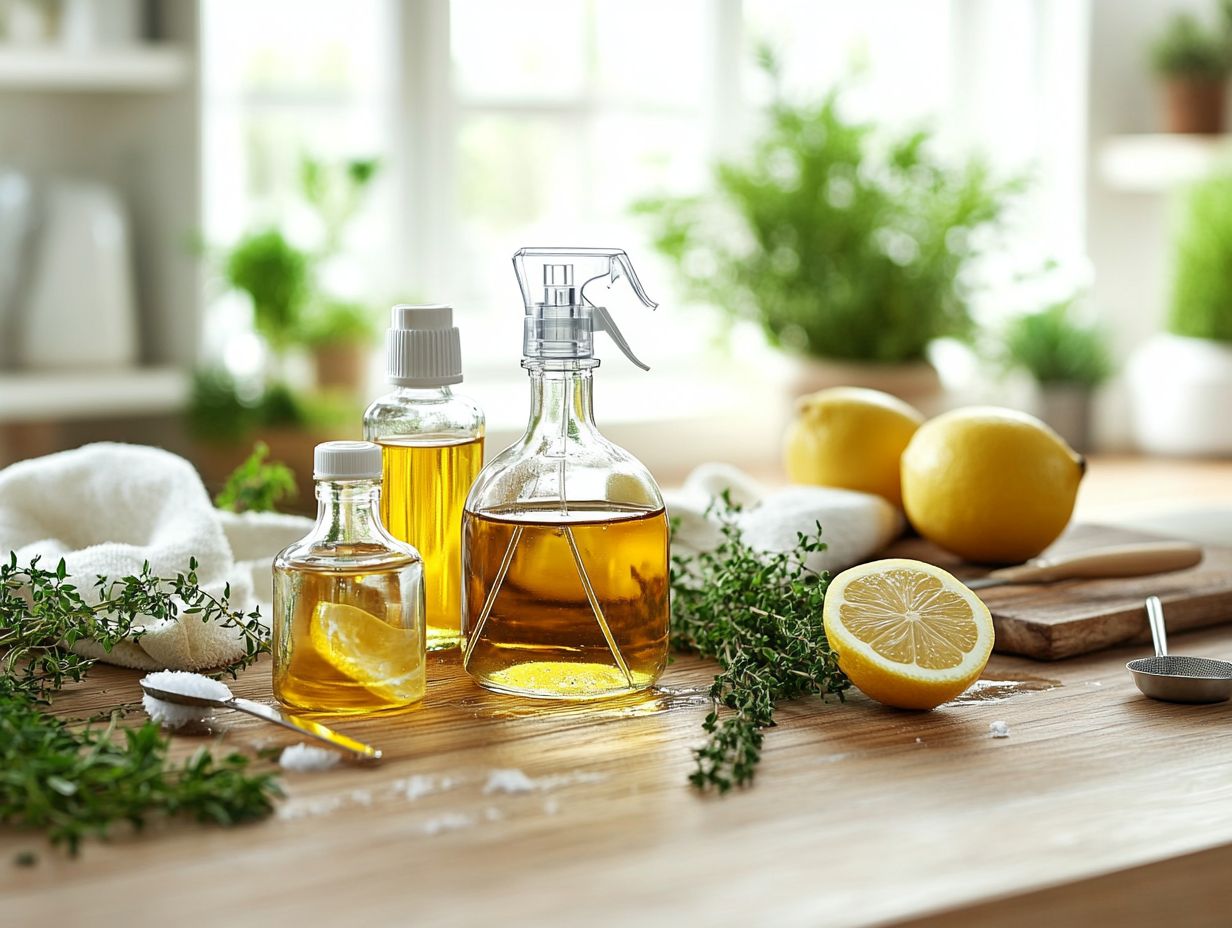
What are essential oils and why are they beneficial in homemade cleaners?
Essential oils are concentrated plant extracts. They contain the natural aromatic compounds of the plant and can fight germs while adding a pleasant scent to your cleaners.
What are some essential oils commonly used in homemade cleaners?
Commonly used essential oils include lemon, lavender, tea tree, peppermint, and eucalyptus. These oils not only clean but also help deodorize your home.
How do I incorporate essential oils into my homemade cleaners?
Add essential oils directly to your cleaner recipes, typically 10-20 drops per 16 ounces of solution. You can also mix them in water for a quick spray cleaner.
Are there any safety precautions to keep in mind when using essential oils in homemade cleaners?
Always dilute essential oils before use. A small patch test is wise to check for allergies, and some oils can be harmful to pets, so choose pet-safe options.
Can essential oils replace chemical cleaners?
Yes, they can often replace chemical cleaners and make your routine more eco-friendly. However, they may not tackle heavy-duty jobs as effectively.
Do essential oils have any other benefits besides cleaning?
Absolutely! Essential oils promote relaxation, reduce stress, and improve your mood. They re also great for skincare and can help with natural remedies.

